allow,permit,advise,forbid 后接动词
只接ing形式的动词口诀

只接i n g形式的动词口诀集团文件发布号:(9816-UATWW-MWUB-WUNN-INNUL-DQQTY-只接ing形式的动词口诀3.0承认喜欢别放弃,允许错过莫介意。
admit enjoy give up allow/permit miss mind逃亡冒险可避免,禁止想象需考虑。
escape risk avoid forbid/prohibit imagine/fancy consider 推迟防止或停止,报告否认应提及。
delay/put off prevent stop report deny mention厌恶也感激,完成靠建议。
dislike appreciate finish advise/suggest原谅容忍与理解,forgive/excuse/pardon bear/stand understand忍不住要持续练习。
can’t help keep(on)practice注意:1.此处所谓ing形式指动名词。
2.此处所谓只接ing形式是指这些动词主动语态下不直接与动词不定式(to do)相接, 而非任何情况下都只直接接动名词。
e.g. allow sb. to do sth. 允许某人做某事 be allowed to do sth. 被允许做某事(以上是正确的结构)3.请注意在词义限定下来记忆本口诀。
e.g. stop 是在表示停止做某事时接 doing,在表示停下来做某事时为stop to do.鸣谢在她高中时把1.0版本教给我的姐姐在我高中时促成了2.0版本的各位英语老师现在促成了3.0版本的无名英雄祝各位同学学习进步,老师工作顺利!。
非谓语动词作宾语的四种类型
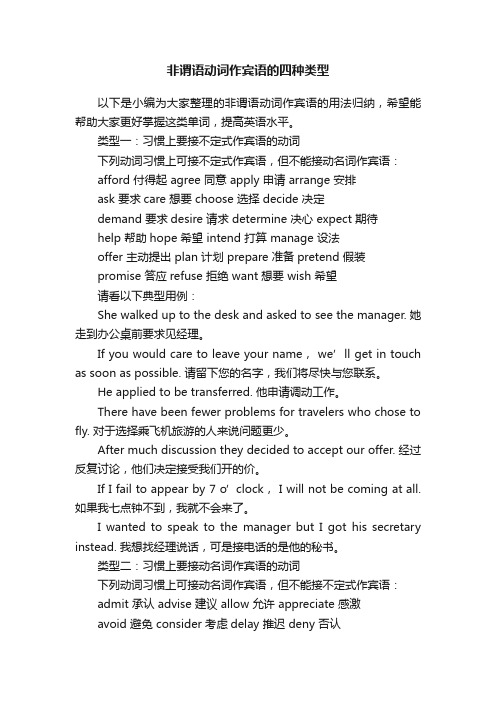
非谓语动词作宾语的四种类型以下是小编为大家整理的非谓语动词作宾语的用法归纳,希望能帮助大家更好掌握这类单词,提高英语水平。
类型一:习惯上要接不定式作宾语的动词下列动词习惯上可接不定式作宾语,但不能接动名词作宾语:afford 付得起 agree 同意 apply 申请 arrange 安排ask 要求care 想要 choose 选择 decide 决定demand 要求desire 请求 determine 决心 expect 期待help 帮助hope 希望 intend 打算 manage 设法offer 主动提出 plan 计划 prepare 准备pretend 假装promise 答应refuse 拒绝 want 想要 wish 希望请看以下典型用例:She walked up to the desk and asked to see the manager. 她走到办公桌前要求见经理。
If you would care to leave your name,we’ll get in touch as soon as possible. 请留下您的名字,我们将尽快与您联系。
He applied to be transferred. 他申请调动工作。
There have been fewer problems for travelers who chose to fly. 对于选择乘飞机旅游的人来说问题更少。
After much discussion they decided to accept our offer. 经过反复讨论,他们决定接受我们开的价。
If I fail to appear by 7 o’clock, I will not be coming at all. 如果我七点钟不到,我就不会来了。
I wanted to speak to the manager but I got his secretary instead. 我想找经理说话,可是接电话的是他的秘书。
非谓语动词易错点(超权威)
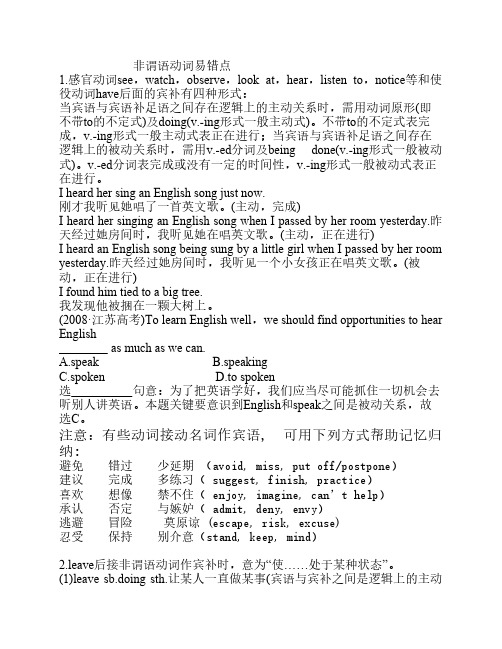
非谓语动词易错点1.感官动词see,watch,observe,look at,hear,listen to,notice等和使役动词have后面的宾补有四种形式:当宾语与宾语补足语之间存在逻辑上的主动关系时,需用动词原形(即不带to的不定式)及doing(v.-ing形式一般主动式)。
不带to的不定式表完成,v.-ing形式一般主动式表正在进行;当宾语与宾语补足语之间存在逻辑上的被动关系时,需用v.-ed分词及being done(v.-ing形式一般被动式)。
v.-ed分词表完成或没有一定的时间性,v.-ing形式一般被动式表正在进行。
I heard her sing an English song just now.刚才我听见她唱了一首英文歌。
(主动,完成)I heard her singing an English song when I passed by her room yesterday.昨天经过她房间时,我听见她在唱英文歌。
(主动,正在进行)I heard an English song being sung by a little girl when I passed by her room yesterday.昨天经过她房间时,我听见一个小女孩正在唱英文歌。
(被动,正在进行)I found him tied to a big tree.我发现他被捆在一颗大树上。
(2008·江苏高考)To learn English well,we should find opportunities to hear English as much as we can.A.speakB.speakingC.spokenD.to spoken选 句意:为了把英语学好,我们应当尽可能抓住一切机会去听别人讲英语。
本题关键要意识到English和speak之间是被动关系,故选C。
注意:有些动词接动名词作宾语, 可用下列方式帮助记忆归纳:避免 错过 少延期 (avoid, miss, put off/postpone)建议 完成 多练习( suggest, finish, practice)喜欢 想像 禁不住( enjoy, imagine, can’t help)承认 否定 与嫉妒( admit, deny, envy)逃避 冒险 莫原谅 (escape, risk, excuse)忍受 保持 别介意(stand, keep, mind)2.leave后接非谓语动词作宾补时,意为“使……处于某种状态”。
非谓语动词作宾语补足语讲解与练习(修订版)

非谓语动词作宾语补足语定义:宾语补足语通常是位于宾语之后,说明宾语的状态、特征的成分,多由名词,形容词、副词、不定式,动名词个分词充当.如:The sun keeps us warm.We call her Jenny.They found him out.Make yourself at home.They wish you to go with them.I heard him singing.You must get your hair cut.宾语+宾语补足语=复合宾语,宾语和宾语补足语之间在逻辑上往往有主表、或者主谓的关系.一、动词不定式作宾补。
1.V1 + sb. + to do sth.常用动词有:advise 建议allow 允许ask 叫,请bear 忍受beg 乞求cause 导致command 命令encourage 鼓励expect 期待forbid 禁止force 迫使get 使hate 讨厌help 帮助intend 想要invite 邀请leave 让like 喜欢mean 打算need 需要oblige 迫使order 命令permit 允许persuade 说服prefer 宁愿request 请求remind 提醒teach 教tell 告诉trouble 麻烦want 想要warn 警告wish 希望wait for 等would like 想要would love 想要would prefer 宁愿persuade (劝说)sb to do sth = persuade sb into doing sth温馨提示:1.advise, forbid,allow, permit 这四个词后既可以直接加动名词作宾语,也可以接不定式作宾语补足语,即构成doing sthadvise/ forbid/ allow/ permitsb to do sth2.fear, excuse, refuse, insist, hope, suggest, agree, decide, demand, thank, arrange 等动词后不可接sb to do sth。
非谓语动词作宾语考点解析
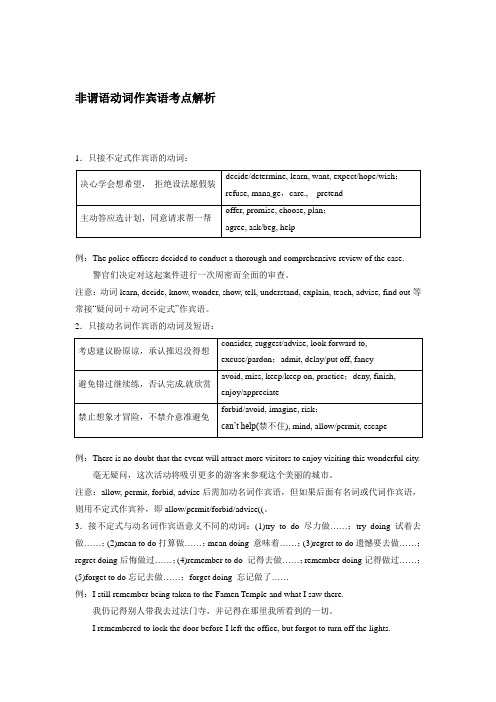
非谓语动词作宾语考点解析1.只接不定式作宾语的动词:决心学会想希望,拒绝设法愿假装decide/determine, learn, want, expect/hope/wish;refuse, mana ge,care, pretend主动答应选计划,同意请求帮一帮offer, promise, choose, plan;agree, ask/beg, help例:The police officers decided to conduct a thorough and comprehensive review of the case.警官们决定对这起案件进行一次周密而全面的审查。
注意:动词learn, decide, know, wonder, show, tell, understand, explain, teach, advise, find out等常接“疑问词+动词不定式”作宾语。
2.只接动名词作宾语的动词及短语:考虑建议盼原谅,承认推迟没得想consider, suggest/advise, look forward to, excuse/pardon;admit, delay/put off, fancy避免错过继续练,否认完成就欣赏avoid, miss, keep/keep on, practice;deny, finish,enjoy/appreciate禁止想象才冒险,不禁介意准避免forbid/avoid, imagine, risk;can’t help(禁不住), mind, allow/permit, escape例:There is no doubt that the event will attract more visitors to enjoy visiting this wonderful city.毫无疑问,这次活动将吸引更多的游客来参观这个美丽的城市。
19-20版:(青云桂新陕甘宁皖粤吉赣豫晋蒙藏贵)Grammar——动词-ing形式作主语和宾语(创

Grammar——动词-ing形式作主语和宾语[思维导图]一、概念动词-ing形式是动词的一种非谓语形式,包括现在分词和动名词两种。
1.动词-ing形式的时态和语态语态主动语态被动语态时态一般式doing being done完成式having done having been done2.动词-ing形式在句中的语法作用动名词在句中作主语、宾语、表语和定语;现在分词在句中作状语、宾语补足语和定语。
二、动词-ing形式作主语1.动词-ing形式直接作主语表示抽象的概念,通常直接置于句首,谓语动词用单数形式。
Reading aloud is a good way to learn a language.朗读是学习语言的一个好办法。
Getting up early is a good habit.早起是一种好习惯。
2.置于句末,用it作形式主语,多见于下面几个句型:It is worth doing...做……是值得的It+be+a waste of time doing...做……是浪费时间的It is/was no good/use doing...做……是没有好处/用的It is a waste of time talking about such useless things.谈论这些没用的事情是在浪费时间。
It is no use crying over spilt milk.覆水难收。
三、动词-ing 形式作宾语的用法1.有些动词和动词短语后常用动词-ing 形式作宾语。
如admit ,appreciate ,avoid ,stand(忍受),consider ,delay ,dislike ,enjoy ,imagine ,escape ,excuse ,suggest ,feel ,like ,finish ,forgive ,mention ,mind ,miss ,practise ,get down to ,give up ,devote...to ,insist on ,keep (on),look forward to ,pay attention to ,put off ,stick to ,be accustomed to =be/get/become used to(习惯于)等等。
advise,promit,allow,forbid比较
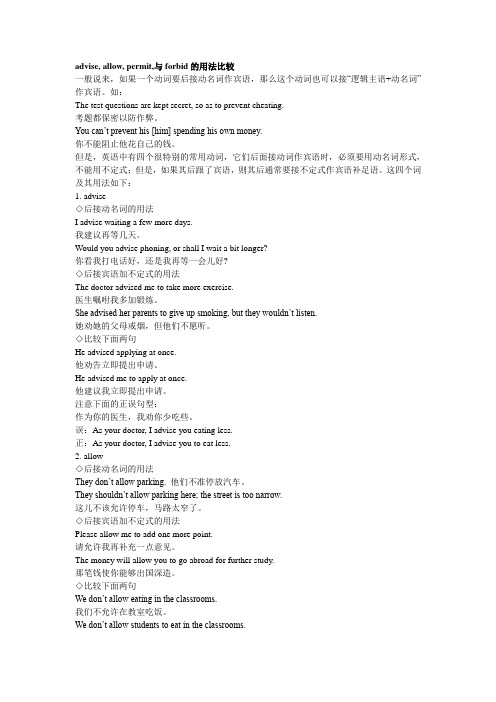
advise, allow, permit,与forbid的用法比较一般说来,如果一个动词要后接动名词作宾语,那么这个动词也可以接“逻辑主语+动名词”作宾语。
如:The test questions are kept secret, so as to prevent cheating.考题都保密以防作弊。
You can’t prevent his [him] spending his own money.你不能阻止他花自己的钱。
但是,英语中有四个很特别的常用动词,它们后面接动词作宾语时,必须要用动名词形式,不能用不定式;但是,如果其后跟了宾语,则其后通常要接不定式作宾语补足语。
这四个词及其用法如下:1. advise◇后接动名词的用法I advise waiting a few more days.我建议再等几天。
Would you advise phoning, or shall I wait a bit longer?你看我打电话好,还是我再等一会儿好?◇后接宾语加不定式的用法The doctor advised me to take more exercise.医生嘱咐我多加锻炼。
She advised her parents to give up smoking, but they wouldn’t listen.她劝她的父母戒烟,但他们不愿听。
◇比较下面两句He advised applying at once.他劝告立即提出申请。
He advised me to apply at once.他建议我立即提出申请。
注意下面的正误句型:作为你的医生,我劝你少吃些。
误:As your doctor, I advise you eating less.正:As your doctor, I advise you to eat less.2. allow◇后接动名词的用法They don’t allow parking. 他们不准停放汽车。
非谓语动词错误例析
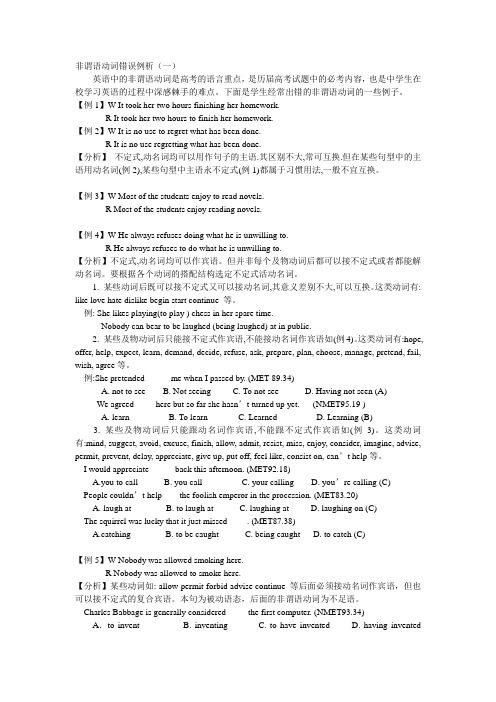
非谓语动词错误例析(一)英语中的非谓语动词是高考的语言重点,是历届高考试题中的必考内容,也是中学生在校学习英语的过程中深感棘手的难点。
下面是学生经常出错的非谓语动词的一些例子。
【例1】W It took her two hours finishing her homework.R It took her two hours to finish her homework.【例2】W It is no use to regret what has been done.R It is no use regretting what has been done.【分析】不定式,动名词均可以用作句子的主语.其区别不大,常可互换.但在某些句型中的主语用动名词(例2),某些句型中主语永不定式(例1)都属于习惯用法,一般不宜互换。
【例3】W Most of the students enjoy to read novels.R Most of the students enjoy reading novels.【例4】W He always refuses doing what he is unwilling to.R He always refuses to do what he is unwilling to.【分析】不定式,动名词均可以作宾语。
但并非每个及物动词后都可以接不定式或者都能解动名词。
要根据各个动词的搭配结构选定不定式活动名词。
1. 某些动词后既可以接不定式又可以接动名词,其意义差别不大,可以互换。
这类动词有: like love hate dislike begin start continue 等。
例: She likes playing(to play ) chess in her spare time.Nobody can bear to be laughed (being laughed) at in public.2. 某些及物动词后只能接不定式作宾语,不能接动名词作宾语如(例4)。
- 1、下载文档前请自行甄别文档内容的完整性,平台不提供额外的编辑、内容补充、找答案等附加服务。
- 2、"仅部分预览"的文档,不可在线预览部分如存在完整性等问题,可反馈申请退款(可完整预览的文档不适用该条件!)。
- 3、如文档侵犯您的权益,请联系客服反馈,我们会尽快为您处理(人工客服工作时间:9:00-18:30)。
doing allow,permit,advise,forbid
sb to do
有这样几道题:
a. We don’t allow __________ in the office.
b. We don’t allow people __________ in the office.
c. People are not allowed __________ in the office.
A. smoking
B. to smoke
C. smoked
D. smoke
此题答案为a句选 A,b句和c句均选 B。
一般说来,动词allow(允许)之后应接动名词作宾语,但是若其后接有名词或代词作宾语,则其宾语后的补足语应用不定式,而不是动名词(注意:c句与b句同义,只是c句为b句的被动形式)。
类似以上用法的动词还有 permit,advise,forbid等:
1. a. We don’t permit _________ on the grass.
b. We don’t perm it people _________ on the grass.
c. People are not permitted _________ on the grass.
A. walk
B. to walk
C. walking
D. walked
2. a. He advised _________ early.
b. He advised us _________ early.
c. We were advised _________ early.
A. leave
B. to leave
C. leaving
D. left
3. a. We forbid __________ a noise.
b. We forbid people __________ a noise.
c. People are forbidden __________ a noise.
A. make
B. to make
C. making
D. made
但动名词前用所有格或物主代词作逻辑主语是可能的:
4. a. He forbids me _________ with them.
b. He forbids my _________ with them.
A. to go
B. going
C. go
D. went
答案:
1. C,B,B
2. C,B,B
3. C,B,B
4. A,B。
